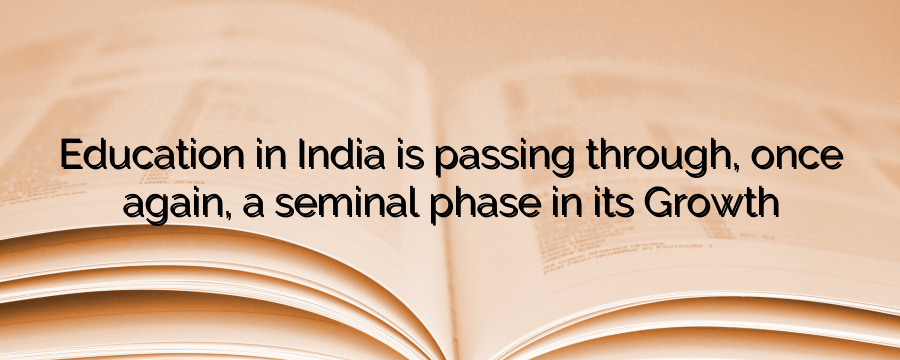India’s education system faces critical challenges, particularly in postgraduate education, and raises questions about policies’ coherence
Education in India is passing through, once again, a seminal phase in its growth. Since 1947, it has passed through several phases of change and each phase has had its own tale to tell.
Generally, education is seen in three phases: school education, college education and postgraduate education. School education is broadly divided into three areas, classes 1 to 5, generally known as primary school; classes 5-10 middle school, and classes 10-12, secondary school. These are not rigid levels but are loosely used for classification and easy communication.
The college-level education is from 1st year to 3rd year, which leads to a bachelor’s degree and 4th year and 5th year, which leads to a postgraduate degree. The doctoral education could thereafter follow. Institutions are known to specialise amongst these various segments and acquire a brand for that. In school education, some do offer class 1 to class 12 education, and there are others who also offer pre-class 1 education which can be termed as a nursery stage.
Postgraduate education, especially after a master’s degree has been normally followed by at least 1 year pre-Ph.Dwork and at least 2 years of PhD work if one has to go through it. Periodic changes have taken place and continue to take place. Illustratively, a formal 1 year pre-Ph.D work which could lead to a terminal M.Phil degree has been recently abolished. This kind of decision clearly has implications because it will affect the career prospects of those who had an M.Phil Degree but did not go for a PhD degree. This act of doing away with an M.Phil award was sudden for a lot of people, and it affected many careers including those that were in the middle of the 1 year M.Phil course. One of the bigger problems was rendering, useless, a whole year of work without prior notice. This kind of jerk and jolt can have arbitrary effects.
This is an aberration which needs to be understood and perhaps modified. One of the questions that remains is that education is a concurrent subject. This means, technically, about a degree like M.Phil, the UGC may legislate something but equally, technically the state legislature could continue a different mandate. The UGC could then refuse to give it cognizance for grants. This could lead to complications. That is another story.
The history of degrees and their awards across the length and breadth of the country has been at times chequered, yet rarely a few have made it a public issue out of this. Thus, it is that the nation coasts along the narrative of the 5th, the 6th and the 7th pay commission. This happens in different regions concurrently. There are certain States where the State Universities have 62 as the age of retirement whereas the Central Universities in the same State have 65 as the age of retirement. This creates artificial pulls and pressures in the flow of talent of the Faculty and others in a given direction. This also affects the availability of talent in the Central Universities of a given State or the State Universities in a given State.
These are not minor matters to be trifled with. However, these issues continue to be treated by default in most situations.
In the meanwhile, the so-called discussion on the National Education Policy continues to go on unabated. Most of the comments being made on the National Education Policy, on what it has stated, are so far positive. This is rightly so because the National Education Policy within the limitations of the announcement has indeed given a higher sense of purpose.
This keeps the education movement going forward.
What does not seem to be noticed, equally, is that there are many aspects of National Education that need an all-India consideration. The above paragraphs given the categories of education at the school stage, the college stage and the university stage, also need some reflection. This is a need that is not yet sufficiently widely understood or appreciated. The greater is the worry because even the commentaries on this in the press are few and far between.
That having been said there is a need to keep the discussion on education alive. All said and done, the Parliament needs to find time to take up some of these collateral issues on a truly comprehensive level.
The form in which the National Education Policy has been enunciated makes for many valid points. Amongst them number the emphasis on the indigenisation of education and finding the Indian roots of many intellectual traditions. This is valid in science, technology, management, literature, medicine, music and more. This is not going to come easy because Indian intellectual traditions are so much a part of life that one gets away even by ignoring their scholastic tradition in formal educational efforts. This state of dualism where something is recognized as a part of life but does not have its due place in the curriculum, is a hiatus that needs to be bridged.



